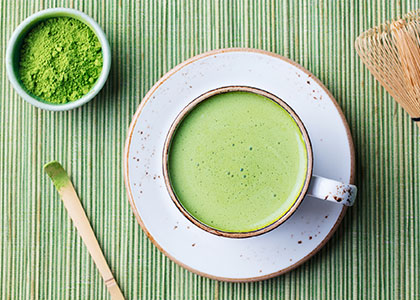
7 Energizing Substitutes for Coffee
By Isabel Smith, MS, RD, CDN
We love coffee and caffeine-rich beverages to rev us up, but if you read my piece about adrenal fatigue, you might have learned that drinking too many of these things can leave us a little zapped for energy. Not to mention, that most of the time (unless paired with a calorie-dense mix-in) coffee doesn’t actually provide us with any energy, but instead really just revs us up; this is because our bodies need calories to run well, not just a stimulant like caffeine that gives us a big perk up!
So how can you still get a little buzz and maybe even some energy without having to drink coffee? I’ve got the answer — try these lower caffeine alternatives and substitutes (both beverages and things you can put in beverages).
7 No/Low Caffeine Substitutes for Coffee:
-
Chaga Mushroom
Mushroom “coffee” is all the rage now, and many of these products are made with the chaga mushroom (although some are powdered and mixed with coffee too). The chaga mushroom has been long touted for its energizing properties, but it also contains other health promoting properties like antioxidants, a compound called melanin that may help to promote healthy skin, and beta glucans that may promote the immune system.
-
Matcha Green Tea
Matcha green tea is a certain type of green tea in which the entire leaf is ground up and mixed with water instead of just steeping the leaves in hot water (see my post on Matcha tea here). Matcha does typically have more caffeine than other types of green tea because the whole leaf is consumed, however it is generally less than coffee.
-
Dandelion Tea or Coffee
Made from dandelion root it can be found in a tea or coffee-like form and both looks and feels a little like coffee, however is actually free of caffeine. Dandelion tea/coffee generally contains about 3 grams of fiber per cup along with some minerals like iron, zinc, and electrolytes like potassium and calcium and many tout it to feel just like coffee (including the “buzz”).
-
Maca Powder
Maca powder comes from the maca root. It’s energizing and can boost virility and stamina so it’s great to use before a workout. One can use maca by adding it to a decaf or low-caffeine tea in the morning or even to add to a smoothie. Maca is totally caffeine free.
-
White Tea
White teas are popular in many different parts of the world, and like other teas, come in all different shapes and sizes. White tea contains health benefits including antioxidants, anti-aging properties, and nutrients that may promote heart health too. When compared to 8 oz coffee, white tea has about 35 mg caffeine per 8 oz serving.
-
Ginseng
Ginseng has long been used in Chinese and herbal medicine for its anti-cancer benefits and even for its energy-promoting properties. Ginseng is known as an adaptogen and may help to support the adrenal system, which can help to promote energy. Try using ginseng similar to how you do your ginger, cut about an inch and pour hot water over the root to have as a beverage.
-
Black Tea
Black teas are certainly higher in caffeine than white or green teas but still less than coffee (47 mg per 8 oz as compared to about 100 mg per 8 oz coffee). Black teas also contain health promoting properties like anti-cancer nutrients, antioxidants, and heart-healthy properties. Try a cup of black tea (like earl gray, chai or other) instead of your usual coffee routine!
If you want to know more about caffeine, check out this article: The Truth About Caffeine